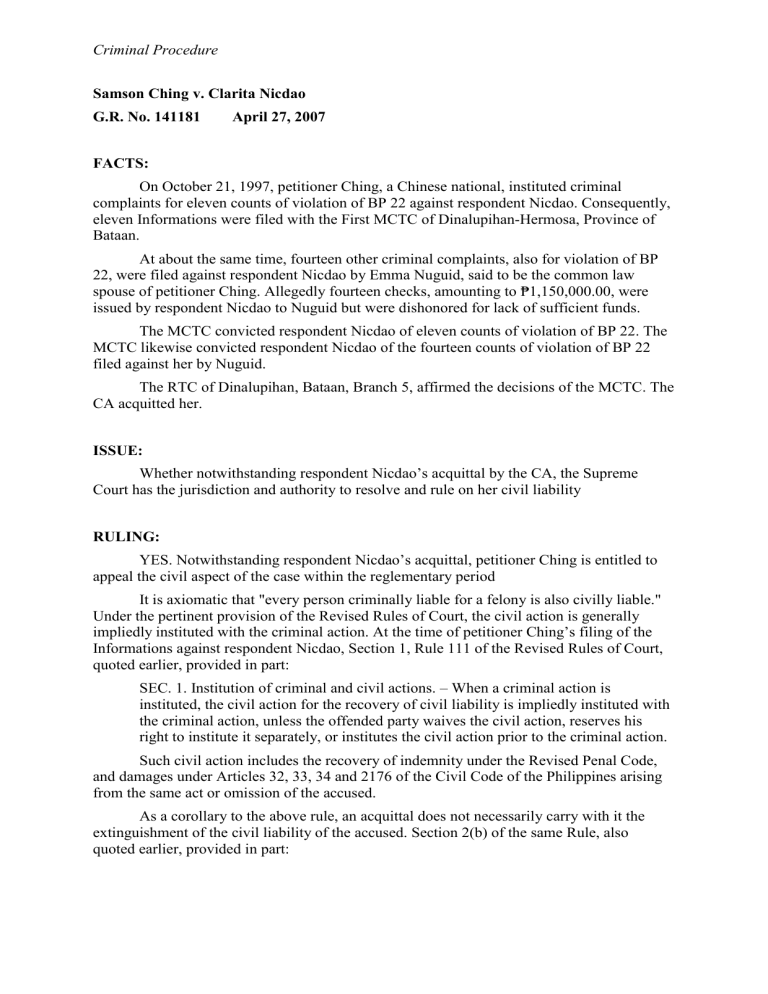
Criminal Procedure Samson Ching v. Clarita Nicdao G.R. No. 141181 April 27, 2007 FACTS: On October 21, 1997, petitioner Ching, a Chinese national, instituted criminal complaints for eleven counts of violation of BP 22 against respondent Nicdao. Consequently, eleven Informations were filed with the First MCTC of Dinalupihan-Hermosa, Province of Bataan. At about the same time, fourteen other criminal complaints, also for violation of BP 22, were filed against respondent Nicdao by Emma Nuguid, said to be the common law spouse of petitioner Ching. Allegedly fourteen checks, amounting to ₱1,150,000.00, were issued by respondent Nicdao to Nuguid but were dishonored for lack of sufficient funds. The MCTC convicted respondent Nicdao of eleven counts of violation of BP 22. The MCTC likewise convicted respondent Nicdao of the fourteen counts of violation of BP 22 filed against her by Nuguid. The RTC of Dinalupihan, Bataan, Branch 5, affirmed the decisions of the MCTC. The CA acquitted her. ISSUE: Whether notwithstanding respondent Nicdao’s acquittal by the CA, the Supreme Court has the jurisdiction and authority to resolve and rule on her civil liability RULING: YES. Notwithstanding respondent Nicdao’s acquittal, petitioner Ching is entitled to appeal the civil aspect of the case within the reglementary period It is axiomatic that "every person criminally liable for a felony is also civilly liable." Under the pertinent provision of the Revised Rules of Court, the civil action is generally impliedly instituted with the criminal action. At the time of petitioner Ching’s filing of the Informations against respondent Nicdao, Section 1, Rule 111 of the Revised Rules of Court, quoted earlier, provided in part: SEC. 1. Institution of criminal and civil actions. – When a criminal action is instituted, the civil action for the recovery of civil liability is impliedly instituted with the criminal action, unless the offended party waives the civil action, reserves his right to institute it separately, or institutes the civil action prior to the criminal action. Such civil action includes the recovery of indemnity under the Revised Penal Code, and damages under Articles 32, 33, 34 and 2176 of the Civil Code of the Philippines arising from the same act or omission of the accused. As a corollary to the above rule, an acquittal does not necessarily carry with it the extinguishment of the civil liability of the accused. Section 2(b) of the same Rule, also quoted earlier, provided in part: Criminal Procedure (b) Extinction of the penal action does not carry with it extinction of the civil, unless the extinction proceeds from a declaration in a final judgment that the fact from which the civil might arise did not exist. It is also relevant to mention that judgments of acquittal are required to state "whether the evidence of the prosecution absolutely failed to prove the guilt of the accused or merely failed to prove his guilt beyond reasonable doubt. In either case, the judgment shall determine if the act or omission from which the civil liability might arise did not exist."
